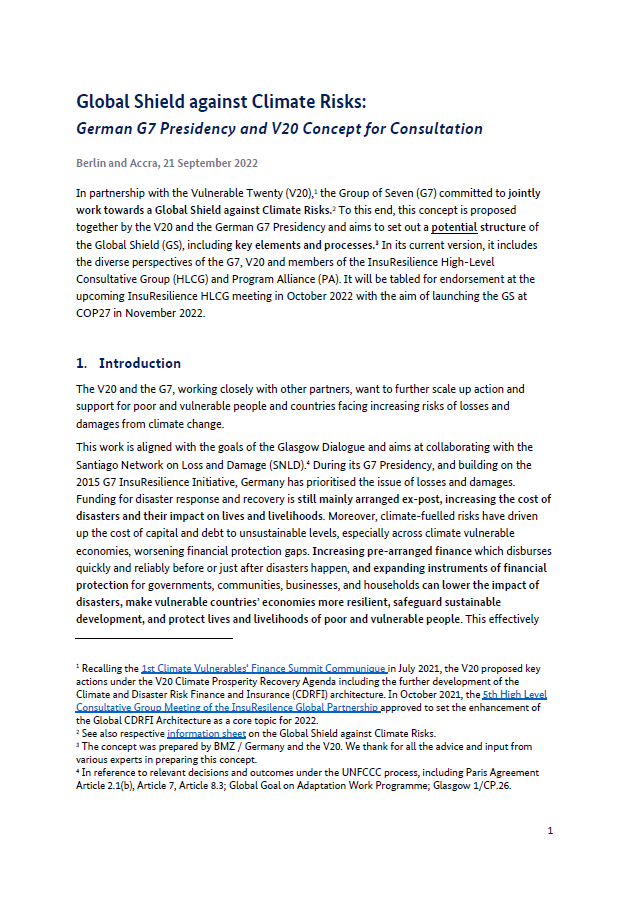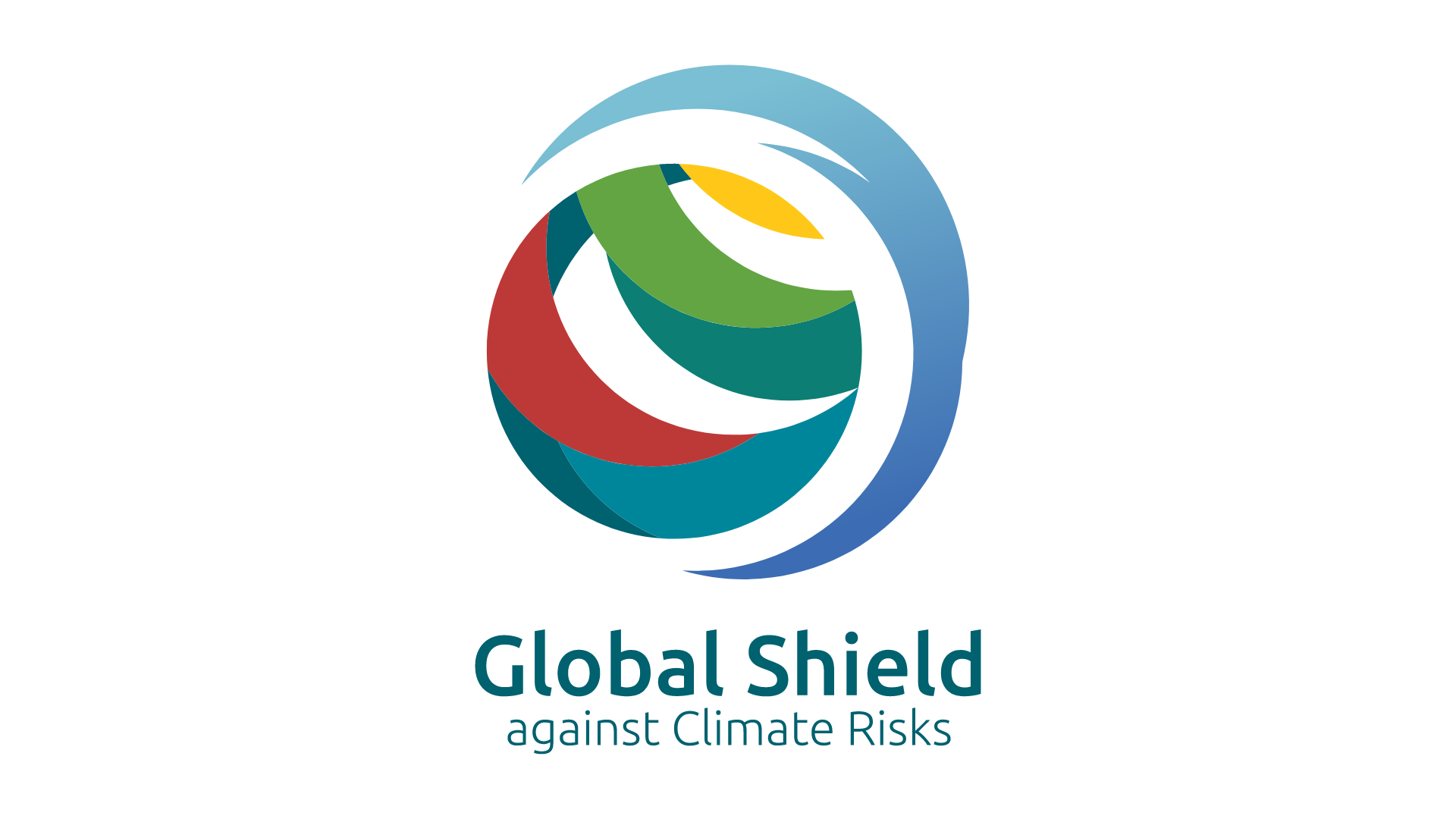Loss and damage protection V20 and G7 jointly launch Global Shield against Climate Risks at COP27
In addition, a broad coalition of countries, multilateral institutions, non-state and private sector partners has underlined their full institutional commitment to Global Shield.
The first recipients of Global Shield packages – called Pathfinder countries – include Bangladesh, Costa Rica, Fiji, Ghana, Pakistan, the Philippines and Senegal.
Ghana Finance Minister Ken Ofori-Atta, V20 Chair: “This is a path breaking effort. We hope our funding window will benefit equally compared to pre-existing structures whose performance remains to be proven. Our fiscal space is under constant threat and the inflationary pressures of climate change are closing out our options. As part of our Climate Prosperity Plan to reduce the 98 percent financial protection sinkhole, the Global Shield will play a key role in resourcing financial and social protection packages to protect our economy, our enterprises and our communities.”
“The Global Shield is long overdue. It has never been a question of who pays for loss and damage because we are paying for it – our economies pay for it in lost growth prospects, our enterprises pay for it in business disruption, and our communities pay for it in lives and livelihoods lost. We really hope the Global Shield will not only yield impact for the most vulnerable communities, but that it will also contribute to building mutual trust and understanding to help bridge the resourcing gaps facing climate action.”
Svenja Schulze, Federal Development Minister of Germany: “Under the German Presidency, the G7 have committed to scale-up action and support on loss and damage and to work towards a 'Global Shield against Climate Risks', responding to the V20’s call. Germany stands by its responsibility to support poor and vulnerable people and countries in dealing with loss and damage. This launch sends a signal: We have heard the urgency and we are acting. We aim at overcoming differences even in challenging circumstances. Germany wants to be a bridge-builder.”
Henry Kokofu, Special Envoy of the Climate Vulnerable Forum (CVF) Ghana Presidency: “This is definitely the start we need, but the more effective we are in innovations like the Shield, the more we have to emphasize that scale matters. We will never tire of reminding our G7 colleagues that they must simply do way better in resource mobilization. We cannot allocate resources as if the climate crisis was an abstract war in some faraway place. The fate of the most vulnerable will be the fate of the world. Have we not noticed the way heat waves have ransacked entire cities in France, Italy, and Spain? Forest fires have invaded the US and flooding has invaded Germany. It is time to wake up. It is time for more path breaking efforts and to grow allocations to enable the ambition of the Shield to cover far more than what it currently protects. For example, the V20 L&D funding program in the Global Shield aims to demonstrate that finance for loss and damage can be meaningfully delivered directly to communities to address losses and damages including community scale infrastructure and livelihood replacement options in a way that could be done at scale.”
Recent V20 research found that 98 per cent of the nearly 1.5 billion people in V20 countries do not have financial protection – a massive sinkhole for these countries whose workforce is mainly employed by small and medium enterprises. According to this research, V20 countries have lost a total of 525 billion US dollars to climate impacts since 2000. As risks of losses and damages from climate change escalate further, the cost of capital and debt have risen to unsustainable levels, especially across climate vulnerable economies.
The Global Shield addresses current weaknesses in the financial protection structure in climate vulnerable economies via pre-arranged finance which disburses quickly and reliably before or just after disasters happen. It expands instruments of financial protection for governments, communities, businesses, and households, thus, lessening the impact of disasters, making vulnerable economies resilient, safeguarding sustainable development, and protecting lives and livelihoods.
In terms of implementation, the Global Shield will align behind vulnerable country strategies for closing protection gaps using a broad range of appropriate instruments. At the household and business level, these instruments comprise, for example, livelihood protection, social protection systems, livestock and crop insurance, property insurance, business interruption insurance, risk-sharing networks, and credit guarantees. At the level of (national and subnational) governments, humanitarian agencies and NGOs, the Global Shield will support the integrated development of instruments used to ensure that money is available when needed (money in), and the processes to ensure that the money is spent on providing what affected individuals and communities need when they need it most (money out).
Germany is providing some 170 million euros as seed contribution, of which 84 million euros are core funding to the Global Shield and 85.5 million euros for related climate risk finance instruments. Further pledges of core funding to the Global Shield include 35 million Danish kroner (about 4.7 million euros) from Denmark, 10 million euros from Ireland, 7 million US dollars from Canada, and 20 million euros from France. Further contributions by donors are expected to materialize soon.
The Global Shield will start its implementation immediately after COP27. The V20 and G7 have decided that it will be steered by the Global Shield High-Level Consultative Group, which includes representatives of the V20, G7, G20, think tanks, civil society, multilateral organizations and the private sector. A financing structure with three complementary funds forms the foundation of the Shield: the Global Shield Solutions Platform, which builds on InsuResilience Solutions Fund, the Global Shield Financing Facility at the World Bank, and the Climate Vulnerable Forum (CVF) & V20 Joint Multi-Donor Fund.
Further details on the Global Shield: Further details on the Global Shield: https://www.v-20.org/global-shield-against-climate-risks (External link)
About V20
Formed in 2015, the Vulnerable 20 Group of Finance Ministers is a dedicated cooperation of economies systematically vulnerable to climate change. Currently chaired by the Republic of Ghana, V20 Group members are also states of the Climate Vulnerable Forum (CVF).
The V20 membership stands at 58 economies representing some 1.5 billion people including Afghanistan, Bangladesh, Barbados, Benin, Bhutan, Burkina Faso, Cambodia, Chad, Colombia, Comoros, Costa Rica, Côte d’Ivoire, Democratic Republic of the Congo, Dominican Republic, Eswatini, Ethiopia, Fiji, The Gambia, Ghana, Grenada, Guatemala, Guinea, Guyana, Haiti, Honduras, Kenya, Kiribati, Kyrgyzstan, Lebanon, Liberia, Madagascar, Malawi, Maldives, Marshall Islands, Mongolia, Morocco, Nepal, Nicaragua, Niger, Palau, Palestine (as a UN non-member observer state), Papua New Guinea, Philippines, Rwanda, Saint Lucia, Samoa, Senegal, South Sudan, Sri Lanka, Sudan, Tanzania, Timor-Leste, Tunisia, Tuvalu, Uganda, Vanuatu, Viet Nam and Yemen.
About G7
The Group of Seven consists of Canada, France, Germany, Italy, Japan, the United Kingdom and the United States of America. The European Union also participates in G7 meetings. Germany took on this year’s G7 presidency from the United Kingdom.










